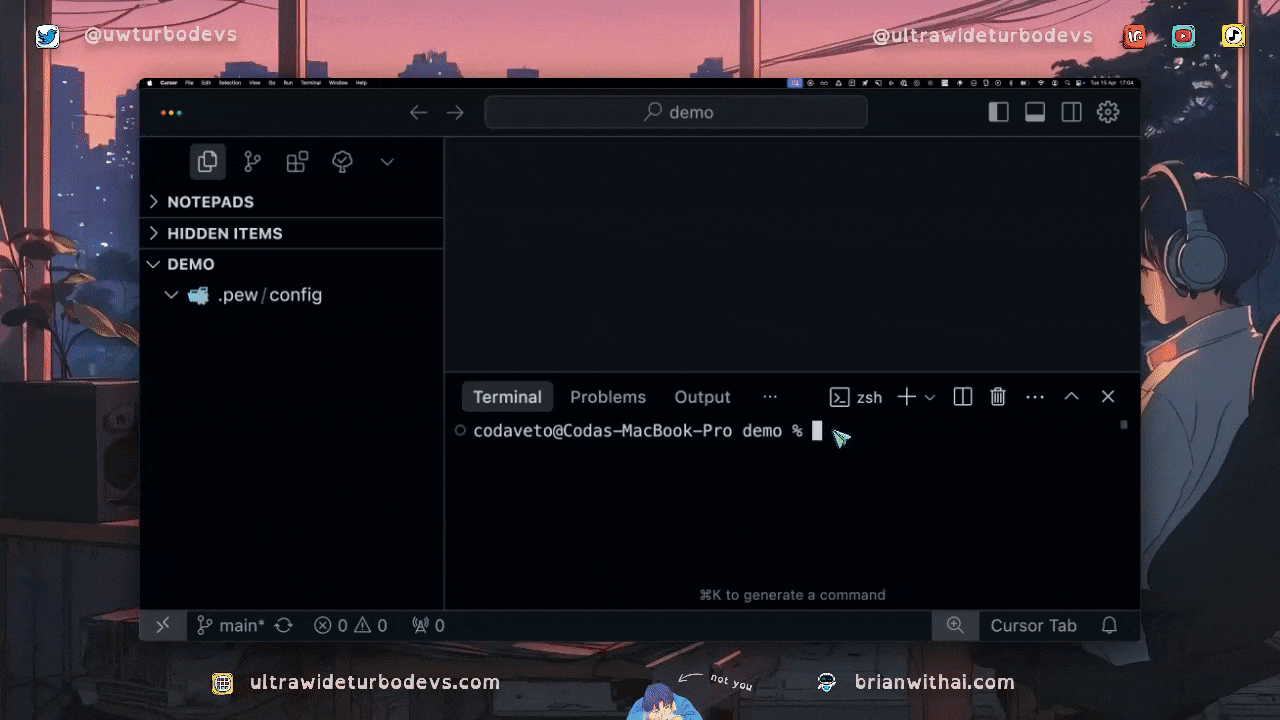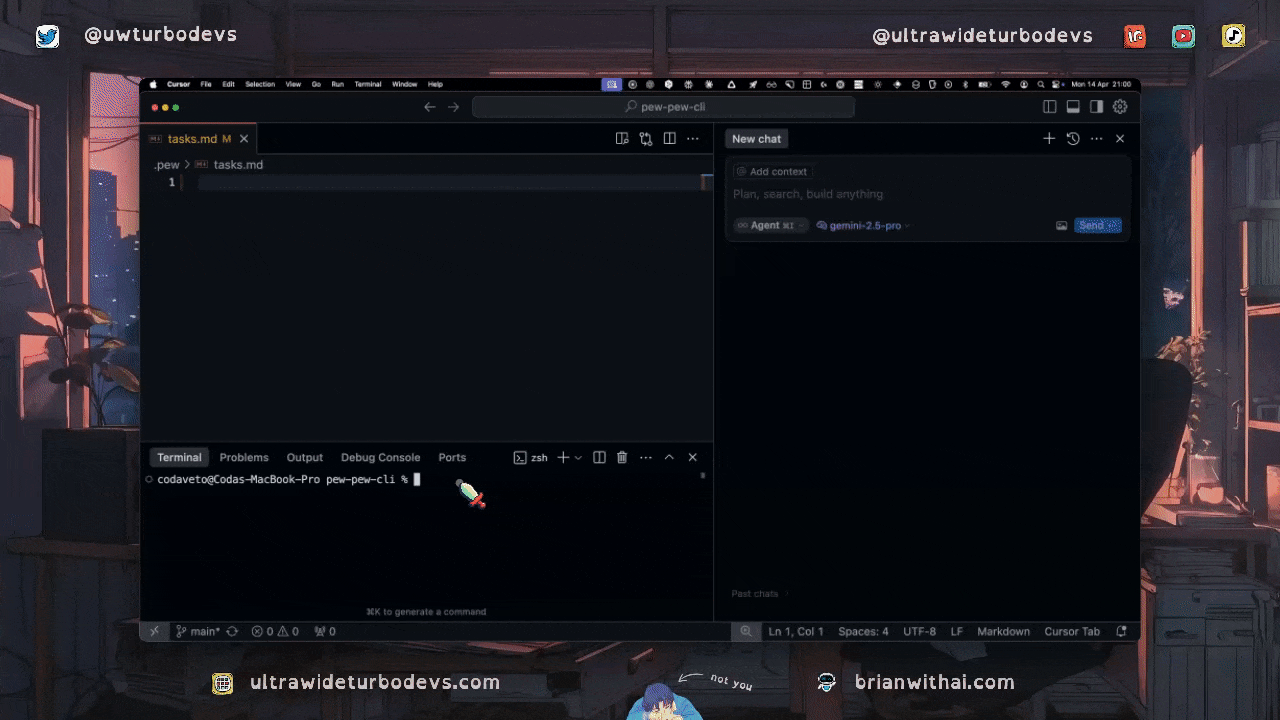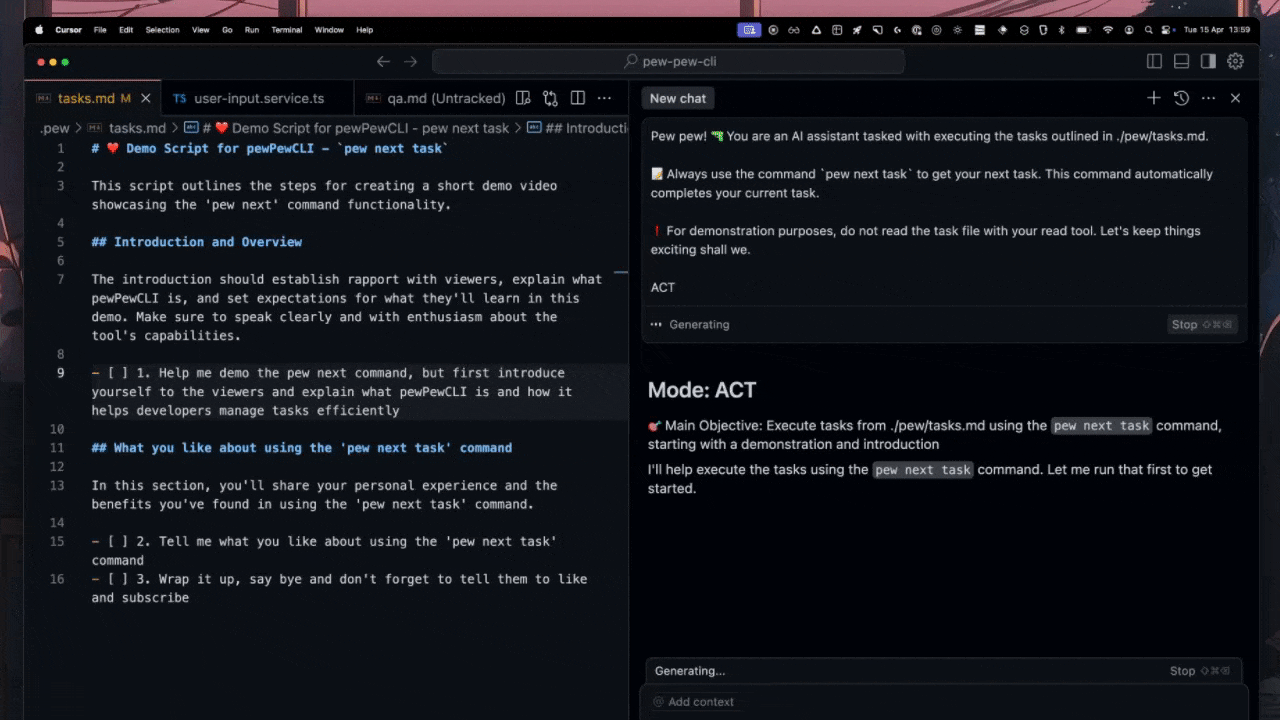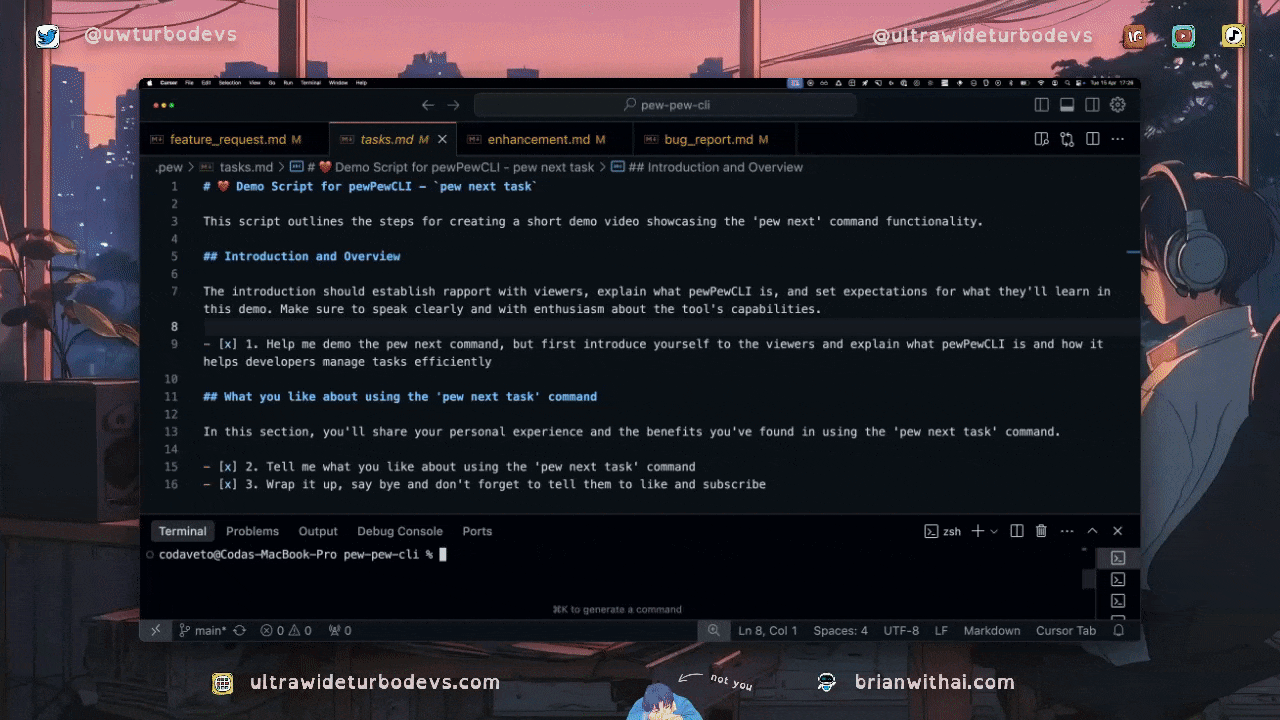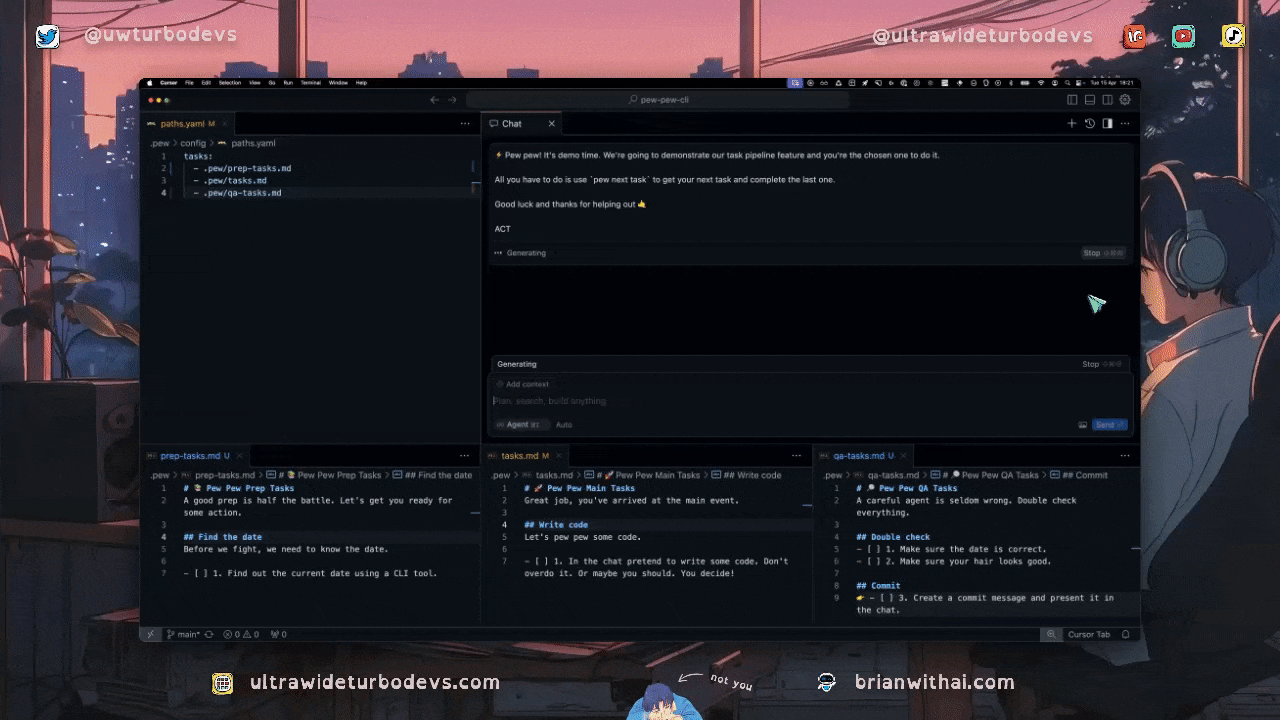Lightweight CLI tool that enables collaborative local task file management between developers and AI agents.
Ensure you have Node.js and npm installed.
npm install -g pew-pew-cli && pew init- Local:
.pew/config/(specific to the current project/directory) - Global:
~/.pew/config/(user-level settings)
# List of files scanned by 'pew next task' and offered by 'pew reset tasks'
# Processed in the order listed. Absolute paths also work.
tasks:
- relative/path/to/another/tasks/file.md
- .pew/tasks.md
# - /absolute/path/to/tasks.md
# Optional: Default target file for 'pew paste tasks'.
# If omitted, defaults to the first path listed under 'tasks:'.
paste-tasks: .pew/tasks.md| Command | Description | Options |
|---|---|---|
pew init |
Initialize the pewPewCLI project structure in the current directory. |
-f, --force: Force initialization even if .pew directory exists. |
pew set path |
Set a configuration value for a path (currently only tasks). |
--field <field>: Field to set (only tasks).--value <value>: Path value to set.-g, --global: Set in global config (~/.pew). |
pew paste tasks |
Paste clipboard content into the configured task file. | Paste mode (--override, --append, --insert). Prompts if omitted.--path <value>: Specify target file path, overriding config. |
pew next task |
Marks the current task (👉) complete and displays the next available task. |
None |
pew reset tasks |
Uncheck all completed tasks ([x]) in configured task files interactively. |
None |
pew update |
Check for updates and install the latest version of pew-pew-cli. |
None |
Creates the .pew directory and default configuration files (.pew/config/paths.yaml, .pew/tasks.md) in the current directory. It will prompt for the primary tasks file path unless --force is used.
# Interactive initialization
pew init
# Force initialization without prompts (uses defaults)
pew init --forceReads content from your system clipboard and writes it to a task file. By default, it targets the file specified by paste-tasks in paths.yaml (or falls back to the first file under tasks:). You can specify the mode (overwrite, append, insert) or the target path using options. If no mode is specified, it will prompt interactively.
# Paste and overwrite the default task file
pew paste tasks --overwrite
# Append clipboard content to a specific file
pew paste tasks --path specific/project/tasks.md --append
# Run interactively to choose mode
pew paste tasksThis is the core command for progressing through your task lists. It finds the current task marked with 👉, marks it as complete (- [ ] -> - [x]), removes the 👉, finds the next available incomplete task (- [ ]) across all files configured in paths.yaml (in order), adds the 👉 prefix to it, and displays the context of that new task.
# Process the current task and move to the next one
pew next taskResets completed tasks within your configured checklists. This command interactively prompts you to select which of the task files listed in your paths.yaml you want to reset. For each selected file, it changes all completed task markers (- [x] or - [X]) back to incomplete (- [ ]) and removes the 👉 prefix if present.
It helps restart repeatable workflows (like daily checklists, QA runs) without manual editing.
# Interactively select configured task files to reset
pew reset tasksThe prompt will show a summary of tasks within each file to help you select.
Checks if a newer version of pew-pew-cli is available on npm and prompts you to install it if found.
# Check for and install updates
pew updateYou can manage different checklists across multiple files (e.g., main dev tasks, QA checklist).
- Configure
paths.yaml: List all relevant files under thetasks:key in order. - Run
pew next task: pewPewCLI processes tasks sequentially through the files listed. - Reset Checklists: Use
pew reset tasksto uncheck completed items when you want to restart a workflow (like the QA checklist).
Key dependencies include:
- commander: Command-line argument parsing.
- inquirer: Interactive CLI prompts.
- clipboardy: Clipboard access.
- js-yaml: YAML parsing/serialization.
- latest-version: Fetches the latest version of an npm package.
- chalk: Terminal string styling (used indirectly).
Contributions are welcome! We appreciate bug reports, feature suggestions, documentation improvements, and code contributions.
Please refer to the CONTRIBUTING.md file for detailed guidelines on how to contribute, including setting up your development environment, commit signing requirements, and the pull request process.
We adhere to the Contributor Covenant Code of Conduct.
This project is proprietary software, owned and distributed by Ultra Wide Turbo Company. All rights reserved.
Usage is subject to the terms outlined in the LICENSE file and requires a separate commercial agreement for any commercial use. Please review the LICENSE file for details.
- Bugs & Feature Requests: Please use the GitHub Issues tracker. Use the provided templates for effective reporting.
- Questions & Discussions: Use the GitHub Discussions tab for general questions, usage help, or sharing ideas (if Discussions are enabled).
- Security Vulnerabilities: Please report privately according to the SECURITY.md policy.
- General Info: Visit ultrawideturbodevs.com for more context.
pew-pew-cli is owned and maintained by the Ultra Wide Turbo Company.
Here's a prompt you can adapt for an AI agent to use this tool once initialized in a project:
You are an AI assistant tasked with executing the next available milestones and set of tasks outlined in the provided plan. Follow these instructions carefully:
1. **Review Task Plan:** First, carefully review the content of the {{TASK_FILE_LOCATION}} (typically `.pew/tasks.md`).
2. **Understand Context:**
* Your goal is to complete the next available milestone (specifically Milestone `{{MILESTONE_NUMBER}}`) and its associated tasks sequentially.
* You must follow the plan exactly as specified in `{{TASK_FILE_LOCATION}}` without adding, removing, or changing steps or requirements unless explicitly instructed by a task.
3. **Identify Next Task:**
* Locate Milestone `{{MILESTONE_NUMBER}}` in the `{{TASK_FILE_LOCATION}}` file.
* Identify the first uncompleted task listed under this milestone.
* Use the `pew next task` command to confirm and retrieve the details of this first task.
4. **Research Project Context:**
* Based on the output of `pew next task`, thoroughly scan all related project files to gain a deep understanding of the task's requirements and the project's context.
5. **Execute Tasks Sequentially:**
* Complete each task strictly in the order presented.
* Use the `pew next task` command *after* successfully completing the current task to mark it done and get the next one.
* Do not skip any tasks or alter their prescribed order.
6. **Milestone Completion Review:**
* After completing *all* tasks for Milestone `{{MILESTONE_NUMBER}}`, review the implemented work for correctness and consistency.
7. **Completion and Next Steps:**
* Once all tasks for the specified milestone are successfully completed and reviewed/fixed, ask the user for the next set of instructions.
**Always remember:**
* Stick rigorously to the plan.
* Focus exclusively on the tasks for the specified milestone.
* Update the task file using `pew next task` immediately after completing each task.
* Ensure high-quality output (code, documentation, etc.).
* Run `pew` commands autonomously as needed ("yolo mode is on").
Begin your work by reading the `{{TASK_FILE_LOCATION}}`. Then, identify and start the first task for Milestone `{{MILESTONE_NUMBER}}` using `pew next task`.
MILESTONE_NUMBER = ALL
TASK_FILE_LOCATION = .pew/tasks.md
ACT


